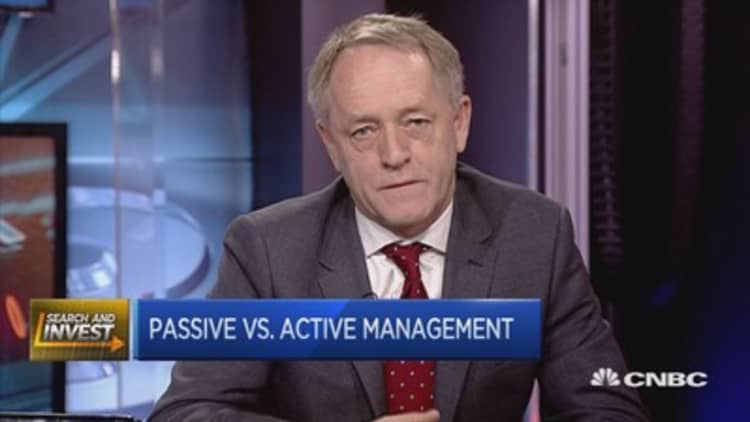Last year saw the continuation of a trend that has gained significant momentum over the past decade as another flood of investor cash drained out of actively-managed funds and into their passively managed counterparts.
Yet the year also saw seismic political changes, prompting some to suggest that heightened political instability in the West, as well as the move away from aggressive quantitative easing by central banks, will feed through into more volatility and differentiation between stock movements. Therein providing a fertile backdrop for active managers to demonstrate their value.
Recent research from Bank of America Merrill Lynch (BAML) looking at U.S. fund returns since 1991 provides some support for this. It shows better fund returns when S&P 500 stocks moved in a less correlated fashion, as well as when the performance difference between the best and worst performing spreads was greater.

The post-financial crisis years have been unhelpful for U.S. fund managers insofar as correlations have been high and differentiation between the top and bottom performing stocks has been low, largely due to the precedence accorded to central bank interventions and macro concerns over individual stock factors.
However, BAML promptly delivers some qualifiers. Firstly, the research team says it has found no evidence that volatility helps fund managers to outperform. Secondly, it cites "virtually no relationship" between the level of interest rates and the success achieved by active managers.
Taking a step back and looking at the broader backdrop faced by active managers today, it is clear that challenges to the industry has mounted over recent decades and show little sign of diminishing.
To begin with the investor bugbear of fees, it is increasingly difficult for active managers to compete with passive managers whose operating expenses are dramatically lower. Futhermore, index funds function as economies of scale, enabling cost savings to be secured as more funds are won. This is amply demonstrated by the price war taking place in exchange-traded funds (ETFs), with market leaders Vanguard and BlackRock both slicing fees again in December, once more upping their value proposition.
This price war, which has also dragged in active managers whose average fees continue to decline, comes against an increasingly expensive reality characterized by burdensome costs for managers to keep up with the latest technology and regulations, and which pummels smaller fund managers the most aggressively.
Meanwhile, competition levels within the fund management industry have erupted. Consider the widespread availability and instantaneous dissemination of information and research, the sheer number of people working in financial services, the greatly increased share of the market dominated by institutional investors and the dramatically increased intensity of trading volumes today.

According to a recent opinion piece in the Financial Times by Charles D. Ellis, founder of Greenwich Associates, over the past 50 years, the number of professionals engaged in price discovery has spiked from an estimated 5,000 to over 1 million today.
All of these pressures are without even touching upon performance. Given the media attention this generates, there is no need to dwell. Suffice to say a sobering report issued by S&P Dow Jones Indices in 2016 revealed that almost all actively managed U.S., global and emerging market funds had failed to outperform benchmarks over the past decade.
There are also undoubtedly some managers who do have an edge, whether that be through specialist knowledge in a less-ploughed field or demonstrably consistent processes and instinct. The difficulty is there are less amateurs for such standouts to battle against in today's market as artificial intelligence-driven machines provide much worthier competition.
Active management serves an essential function in markets, above all providing price discovery and liquidity, at critical points moving against the grain and all of the trading vehicles programmed to move with it. Its necessary role then suggests the seemingly inexorable flow of money from active to passive will have to stop at some point.
The question for investors, therefore, is whether they truly believe they have found one of the active fund management superstars for whom it is worth paying higher fees or whether they are just helping pay for an expensive service to help market functionality to the benefit of other investors.


